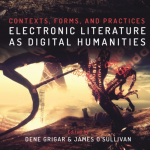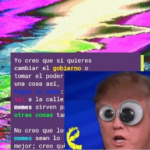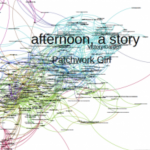electropoetics
“looked at me like I was wild s”: The Mediation of Settler-Colonial Visuality in Jordan Abel’s Injun

Alois Sieben investigates how Jordan Abel’s Injun experiments—poetically, visually, digitally—with an anxiety-provoking limit to the settler-colonial gaze, rather than feeding this gaze a new representation of Indigeneity. Abel’s work is positioned within David Garneau’s history of Indigenous screen objects, in which something is held back from the settler-colonial gaze, a form of deprivation that exposes the blind hunger of this gaze, turning it back upon itself.
Electronic Literature as Digital Humanities: An Introduction

Electronic Literature as Digital Humanities: Contexts, Forms & Practices is a volume of essays co-edited by Dene Grigar and James O’Sullivan that provides a detailed account of born-digital literature by artists and scholars who have contributed to its birth and evolution. Rather than offering a prescriptive definition of electronic literature, this book takes an ontological approach through descriptive exploration, treating electronic literature from the perspective of the digital humanities (DH)––that is, as an area of scholarship and practice that exists at the juncture between the literary and the algorithmic.
Experimental Electronic Literature from the Souths. A Political Contribution to Critical and Creative Digital Humanities.

Claudia Kozak evaluates the potential of experimental e-lit to build decolonial critical paths within global digital humanities. Framing her perspective in the Epistemologies of the South (Sousa Santos) and decolonial thinking (Mignolo), she draws attention to politics of knowledge and analyses issues such as linguistic hegemonies, e-lit imaginaries and genealogies emerging from the Souths and unexpected mixtures between experimentalism and third-generation e-lit in Latin America.
Documenting a Field: The Life and Afterlife of the ELMCIP Collaborative Research Project and Electronic Literature Knowledge Base

The ELMCIP Electronic Literature Knowledge Base is a large-scale digital humanities database that emerged from a six-nation European research project on electronic literature. The Knowledge Base has since grown to become the most comprehensive open-access contributory database in the field, and is still actively developed. The project director, Scott Rettberg, reflects on the process involved in developing the database and the challenges involved in continuing to document the ever-changing landscape of the field of electronic literature.
Excavating Logics of White Supremacy in Electronic Literature: Antiracism as Infrastructural Critique

Thinking about the ways in which critical infrastructure studies can allow us to engage in antiracism critiques and practices, Ryan Ikeda provocatively challenges the electronic literature community to address some of the symbolic and material structures that he argues uphold the field. To this end, Ikeda positions elit infrastructure as dynamic and generative sites of cultural activity, and attends, in particular to the ELMCIP Knowledge Base, recent ebr discourses on decolonization, ELO fellowships, and literary historical genealogies, to examine how each constructs, affirms, racializes and extends power, privilege, and status to its members.